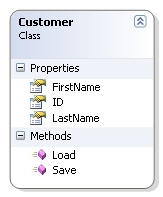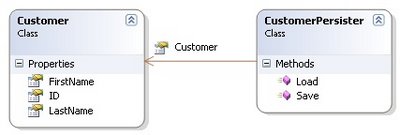There should never be more than one reason for a class to change.Essentially SRP enforces the concept of high cohesion that should not only be applied to classes but also internals of a class, such as methods. So why is SRP such an important design principle? It is because a class with multiple responsibilities is more difficult to change and more difficult to reuse (design smells: fragility and immobility). While SRP is quite easy to understand, it's not always logical to implement. Consider the following class:

Given the convenience of having a customer class that is smart enough to know how to load and save itself, would you rather break it out like this?:

According to SRP, you should, because the combined customer class shares multiple responsibilities: customer business logic, and customer persistence logic. In fact if you use TDD, you may even be forced to separate these two responsibilities.
In practicality, however, while we should keep this principle in mind and try to apply it wherever it makes sense, we should never get so carried away that we start introducing other design smells in our architecture, such as Rigidity, Viscosity, and Needless Complexity.




2 comments:
Well. I think that you should separate those two. Will you always save the information to a file? Will you always save it in the same format? I think not =)
There is not really a silver bullet, if you will, and whether or not to apply this principle should be determined by the situation at hand. There may be situations where extensibility is required, in which case separation of business logic from persistence logic shall be desirable; in other situations where, for example, you are guaranteed to always be persisting to a file in the same format, for example, separating these responsibilities may only introduce needless complexity.
Post a Comment